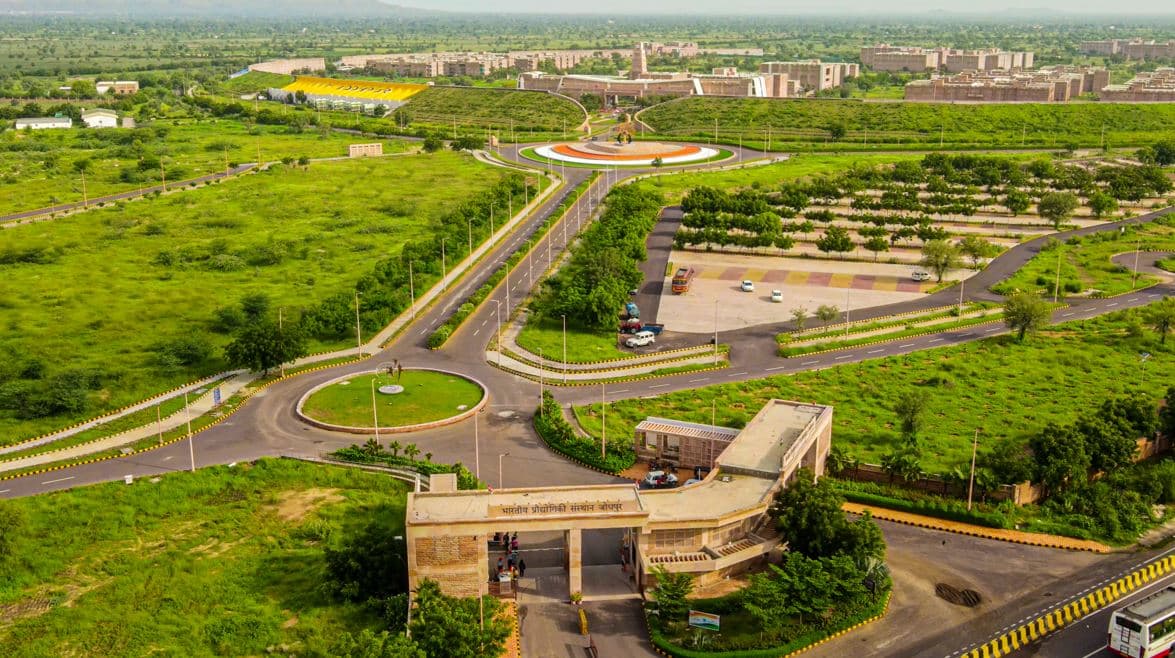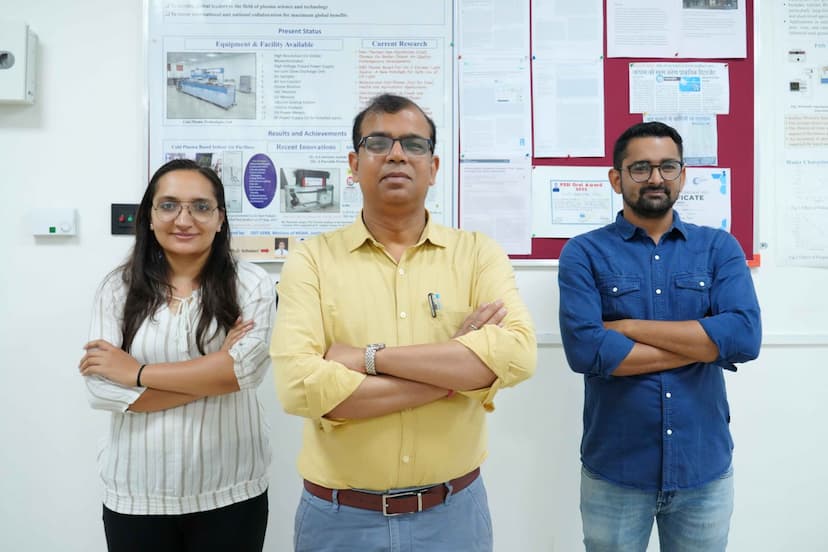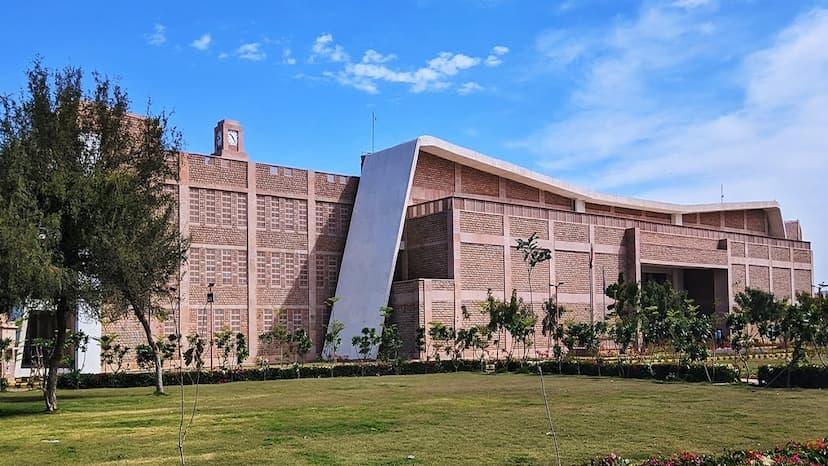IIT Jodhpur comes up with great new innovation

IIT Jodhpur has unveiled a pioneering technique for treating wastewater from the textile dyeing industry, notorious for releasing harmful substances like azo dyes into the environment.
This new method leverages environmentally friendly far ultraviolet (UV) light at 222 nm, offering significant advantages over conventional mercury-based UV light at 254 nm, say sources from IIT Jodhpur.


Effective treatment of this wastewater is crucial to prevent environmental pollution and promote sustainable water reuse, say sources from IIT Jodhpur.
The Solution: Researchers at IIT Jodhpur, led by Dr. Ram Prakash, Professor in the Department of Physics, along with PhD students Ms. Kiran Ahlawat and Mr. Ramavtar Jangra, have developed a novel approach using a 222 nm Kr/Cl2 excimer UV light source.
Their method has shown remarkable effectiveness in breaking down Reactive Black 5 (RB5), a common dye in textile wastewater.

The study, published recently in Nature:
Scientific Reports (https://doi.org/10.1038/s41598-024-63012-z), explored both direct photolysis and an advanced oxidation process (AOP) using titanium dioxide (TiO2) and hydrogen peroxide (H2O2), say sources from IIT Jodhpur.
The degradation rate of RB5 was found to be approximately 27 times faster with their designed excimer-222 light and H2O2 AOP compared to conventional UV-C based methods, say sources from IIT Jodhpur.
Key Findings
# Enhanced Absorption: The higher molar absorption coefficient of RB5 dye at 222 nm significantly improves degradation efficiency.

# Energy Efficiency: The 222 nm UV light and H2O2 process is five times more energy-efficient than using TiO2, making it more sustainable and cost-effective.
# Optimal Conditions: The highest degradation rates were achieved at an alkaline pH of 10, which is typical for textile wastewater, eliminating the need for pH adjustment.
# Degradation Pathway: Advanced analytical techniques established a detailed pathway for RB5 degradation under 222 nm UV light.
# Environmental Impact: The mercury-free UV lamps and the non-toxic nature of the treated water make the process environmentally friendly and suitable for reuse in agriculture, say sources from IIT Jodhpur.

Broader Implications
This innovative method offers several benefits over conventional wastewater treatment techniques:
# Eco-Friendly: Avoids hazardous chemicals and eliminates the need for catalyst recovery.
# Energy Saving: Significantly reduces energy consumption.
# Scalable: Can be scaled up for industrial applications, providing a viable solution for the global textile industry.
# Eco-Friendly: Avoids hazardous chemicals and eliminates the need for catalyst recovery.
Energy Saving: Significantly reduces energy consumption.
# Scalable: Can be scaled up for industrial applications, providing a viable solution for the global textile industry.

Future Directions
The team at IIT Jodhpur plans to conduct further research to optimize the process and explore its application in real-world industrial settings.
Additionally, they aim to investigate the use of far UV-C light for other environmental cleanup operations and sustainable agricultural practices.
About IIT Jodhpur
| Indian Institute of Technology Jodhpur was established in 2008, to foster technology education and research in India. The Institute is committed to technological thought and action to benefit the economic development of India. Scholarship in teaching and learning; Scholarship in research and creative accomplishments; and relevance to Industry are three driving forces for us at IIT Jodhpur. |
| IIT Jodhpur functions from its sprawling residential Permanent Campus of 852 acres on National Highway 65, north-northwest of Jodhpur towards Nagaur. This campus is meticulously planned and envisioned to stand as a symbol of academics – simple, but deep. |
The Institute is committed to multidisciplinary approach of technology development.
S. Vishnu Sharma S Vishnu Sharmaa now works with collegechalo.com in the news team. His work involves writing articles related to the education sector in India with a keen focus on higher education issues. Journalism has always been a passion for him. He has more than 10 years of enriching experience with various media organizations like Eenadu, Webdunia, News Today, Infodea. He also has a strong interest in writing about defence and railway related issues. Related NewsVignan University Admission 2026: Dates, Fees, Eligibility, Application Process Published at : 13 Dec 2025, 4:41 PM IST Updated at : 13 Dec 2025, 4:41 PM IST Vignan University, officially known as Vignan’s Foundation for Science, Technology & Research (VFSTR), is one of India’s leading deemed-to-be universities, located in the Guntur district, Andhra Pradesh. Known for its strong academic framework, industry-oriented curriculum, and modern infrastructure, Vignan University attracts thousands of students every year from across the country. Vignan University Admission 2026 will be conducted for a wide range of undergraduate (UG), postgraduate (PG), and doctoral (PhD) programs in engineering, management, science, law, pharmacy, agriculture, and humanities. This article provides a comprehensive overview of important dates, eligibility criteria, course-wise fees, entrance exams, and the complete application process to help students make informed decisions.  About Vignan UniversityEstablished in 2008 and recognised by the University Grants Commission (UGC), Vignan University has earned a strong reputation for academic excellence, research innovation, and placement support. The university follows outcome-based education and emphasises skill development, entrepreneurship, and global exposure. Key highlights of Vignan University include:
State-of-the-art laboratories and research centres  Strong industry collaborations Dedicated placement and career guidance cell Scholarships for meritorious and deserving students  Vignan University Admission 2026 – Important Dates (Tentative)The official admission schedule for 2026 will be released on the university’s website. Based on previous admission cycles, the tentative timeline is as follows:
Last Date to Apply: March–April 2026 Entrance Exam (Vignan Admission Test – VAT): April–May 2026  Result Declaration: May 2026 Counselling & Seat Allotment: May–June 2026 Commencement of Classes: July–August 2026 Note: Dates may vary for different programs and national-level entrance exams. Courses Offered at Vignan UniversityUndergraduate (UG) Programs
B.Sc (Agriculture, Data Science, Computer Science) BBA BCA BA B.Com B.Pharm BA LLB / BBA LLB Postgraduate (PG) Programs
MBA MCA M.Sc M.Pharm LLM Doctoral Programs
Vignan University Admission 2026 – Eligibility CriteriaUG Eligibility Criteria
For B.Tech: Physics, Chemistry, and Mathematics as compulsory subjects Minimum aggregate marks: 50% (45% for reserved categories) Valid score in Vignan Admission Test (VAT) or accepted national-level entrance exams PG Eligibility Criteria
Minimum aggregate of 50% marks Entrance exam score (VAT / GATE / CAT / MAT, depending on the program) PhD Eligibility Criteria
Candidates must qualify in the PhD entrance test and interview conducted by the university Entrance Exams Accepted by Vignan UniversityVignan University conducts its own entrance examination called the Vignan Admission Test (VAT) for various UG and PG programs. In addition, it also accepts scores from national-level exams such as:
AP EAMCET – Engineering & Agriculture CAT / MAT / XAT / CMAT – MBA GATE – M.Tech GPAT – M.Pharm Admission is granted based on entrance exam performance, academic record, and counselling process. Vignan University Fees Structure 2026 (Expected)The fee structure varies depending on the course and specialisation. Below is an approximate annual fee range: UG Fees
BBA / BCA / B.Com: ₹80,000 – ₹1,20,000 per year B.Sc Agriculture: ₹1,50,000 – ₹1,80,000 per year Law Programs: ₹1,20,000 – ₹1,50,000 per year PG Fees
MBA: ₹1,50,000 – ₹2,00,000 per year MCA: ₹1,20,000 – ₹1,50,000 per year PhD Fees
Additional charges may apply for hostel accommodation, transportation, and other facilities. Scholarships at Vignan UniversityVignan University offers various scholarships to support students financially:
Sports Scholarships for national and state-level players Need-Based Financial Assistance Government Scholarships for eligible reserved categories Scholarships may cover partial or full tuition fees depending on performance and eligibility. Vignan University Application Process 2026The application process is completely online and user-friendly. Follow the steps below to apply: Step 1: Online Registration
Register using a valid email ID and mobile number Step 2: Fill Application Form
Select the desired course and specialisation Step 3: Upload Documents
Signature Academic certificates and mark sheets Step 4: Pay Application Fee
Step 5: Submit Application
Submit the form and download the confirmation page After submission, candidates must appear for the entrance exam, followed by counselling and document verification. Counselling and Admission Process
Seat allotment is based on rank, preferences, and availability Candidates must pay the admission fee to confirm their seat Final admission is granted after document verification Why Choose Vignan University?
High placement rates with top recruiters Industry-focused curriculum Research-driven learning environment Excellent campus facilities and student life Graduates from Vignan University are placed in reputed organizations across IT, core engineering, management, and research sectors. ConclusionVignan University Admission 2026 offers a promising opportunity for students seeking quality education, practical exposure, and strong career prospects. With a wide range of UG, PG, and PhD programs, competitive entrance exams, and comprehensive student support, Vignan University continues to be a preferred choice for higher education in India. Candidates are advised to regularly check official notifications, prepare well for entrance exams, and complete the application process within deadlines to secure admission. Vani Jha Vani Jha is a creative content writer with over 2 years of experience in producing engaging, informative, and well-researched content across various domains. Her expertise lies in SEO, research, editing, and content and copywriting. With a proven track record in enhancing online presence and audience engagement, Vani excels in crafting compelling articles, blogs, and other written materials. Related NewsExam NewsRBSE 2026 Exam Dates Out: Class 10 & 12 Date Sheet Expected Soon — Live Updates12 Dec, 2025 CLAT 2026 Answer Key Released LIVE: Check NLU Key, Response Sheet & Calculate Your Score11 Dec, 2025 How to Fill the NDA 2026 Application: A Step-by-Step Guide11 Dec, 2025 Five Essential Eligibility Rules for JEE Advanced 2026 Revealed by IIT Roorkee9 Dec, 2025 Featured NewsPandit Deendayal Upadhyaya Telecom Excellence Awards 2024: Apply by September 30 at awards.gov.in12 Aug, 2024 Top 20 Management Colleges in Telangana12 Aug, 2024 Top 20 Colleges for Psychology in India11 Aug, 2024 Top IITs Launch Future-Proof Courses : New Tech-Savvy Courses in 202411 Aug, 2024 Hindenburg Research: A Crucial Study for Commerce Students10 Aug, 2024 College NewsMUJ Achieves a Historic Academic Milestone: 2000+ Scopus Publications in a Single Year!12 Dec, 2025 Building the Future Together: ICSDG 2025 Panel on Industry–Academia Synergy10 Dec, 2025 Experience the MBA Journey First-Hand: A Special Webinar for Aspirants8 Dec, 2025 Amity University Jaipur Organises HR Conclave 20255 Dec, 2025 |





